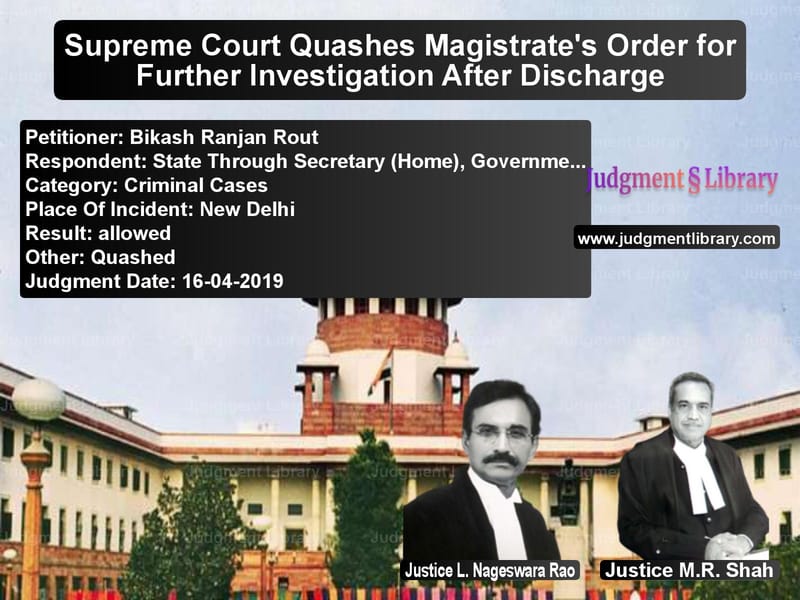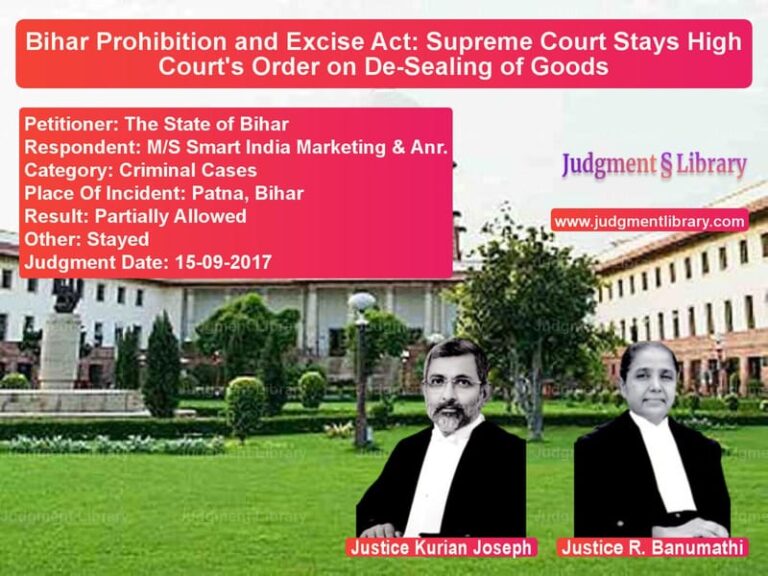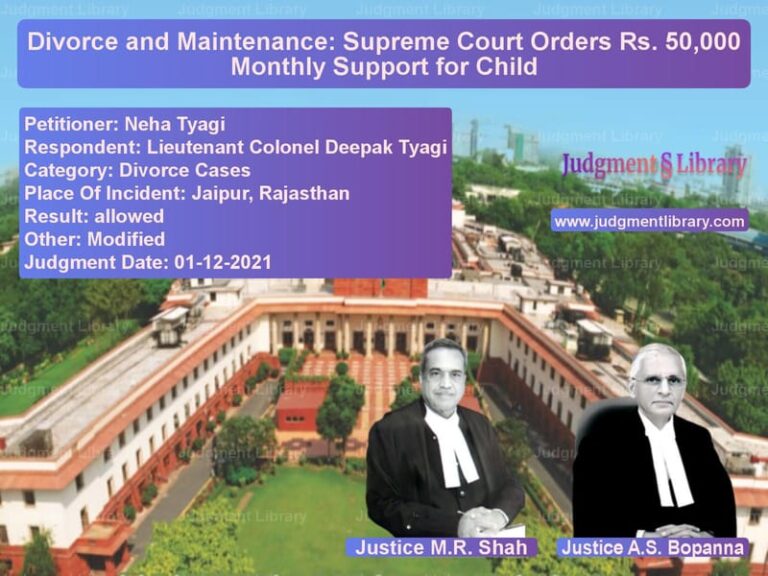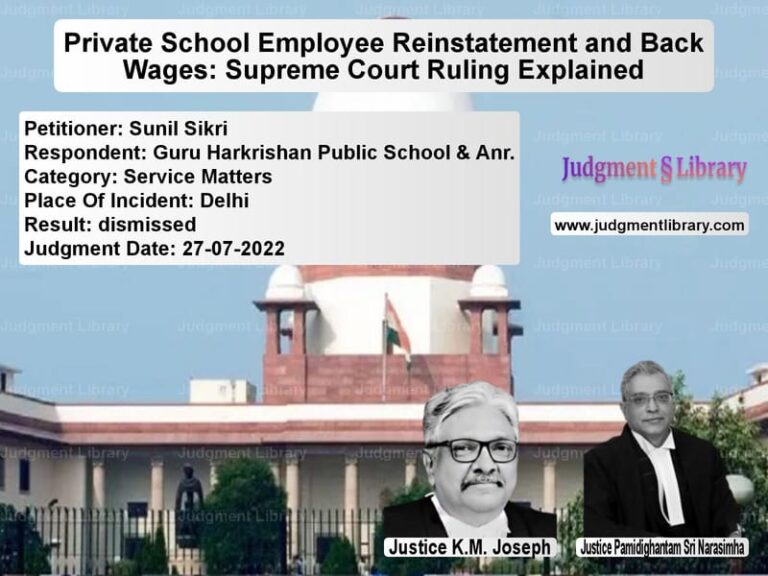Supreme Court Quashes Magistrate’s Order for Further Investigation After Discharge
In a significant ruling, the Supreme Court of India quashed an order by a Magistrate directing further investigation after the accused had been discharged. The case, Bikash Ranjan Rout vs. State Through Secretary (Home), Government of NCT of Delhi, examined the legality of a Magistrate ordering further investigation under Section 173(8) of the Code of Criminal Procedure (CrPC) after discharging the accused.
The ruling sets an important precedent by clarifying the distinction between pre-cognizance and post-cognizance stages of a criminal trial and restricting the Magistrate’s power to order further investigation once an accused is discharged.
Background of the Case
The case originated from an FIR registered against the appellant under Sections 420, 468, and 471 of the IPC at Janakpuri Police Station, Delhi. The investigation resulted in the filing of a charge sheet, but upon examination of the charge sheet, the Magistrate discharged the accused. However, in the same order, the Magistrate also directed the police to conduct further investigation.
Key developments in the case:
- September 28, 2007: An FIR was registered against the accused.
- 2013: The Magistrate discharged the accused but simultaneously ordered further investigation.
- 2013: The accused challenged the order before the Delhi High Court.
- 2014: The High Court upheld the Magistrate’s order for further investigation.
- 2019: The Supreme Court set aside the orders of both the Magistrate and the High Court.
Arguments by the Appellant (Bikash Ranjan Rout)
The appellant contended that:
- Once the accused is discharged, the Magistrate becomes functus officio and has no authority to order further investigation.
- Under Section 173(8) of the CrPC, further investigation can only be conducted at the request of the police, not by a suo moto order of the Magistrate.
- The order directing further investigation violated Section 167(2) of the CrPC, which governs time limits for investigations.
- The High Court failed to distinguish between pre-cognizance and post-cognizance stages in criminal proceedings.
Arguments by the Respondent (State of NCT of Delhi)
The State defended the order for further investigation, arguing:
- The investigation was incomplete, and crucial aspects were not examined.
- The Magistrate acted within his jurisdiction to ensure a fair trial.
- The High Court correctly upheld the Magistrate’s power to direct further investigation.
Supreme Court’s Observations and Ruling
The Supreme Court examined whether a Magistrate has the authority to order further investigation after discharging an accused.
1. Magistrate Becomes Functus Officio After Discharge:
The Court ruled:
“Once the Magistrate has passed an order of discharge, he has no jurisdiction to order further investigation suo moto.”
The judgment clarified that once a Magistrate has evaluated the charge sheet and evidence and decided to discharge the accused, he ceases to have authority over the investigation.
2. Further Investigation Must Be Initiated by Police:
The Court emphasized:
“Under Section 173(8) CrPC, further investigation can be conducted only at the instance of the police, not by a Magistrate’s order.”
The ruling reaffirmed that while police have the power to request further investigation, a Magistrate cannot unilaterally order such an action after discharging the accused.
3. Distinction Between Pre-Cognizance and Post-Cognizance Stages:
The Court distinguished between a Magistrate’s powers before and after taking cognizance of a case:
- Before Cognizance: The Magistrate may direct further investigation under Section 156(3) of the CrPC.
- After Cognizance: The Magistrate can take action under Sections 227 and 228, but cannot order further investigation once an accused is discharged.
Final Ruling
The Supreme Court allowed the appeal and held:
- The order of the Magistrate directing further investigation was illegal and was quashed.
- The High Court’s ruling upholding the Magistrate’s order was set aside.
- The police could still seek further investigation, but only through a formal request under Section 173(8) CrPC.
Implications of the Judgment
The ruling has significant implications for criminal law and procedural fairness:
- Judicial Restraint: The judgment restricts Magistrates from interfering in investigations once they have discharged an accused.
- Clarification on Section 173(8) CrPC: Further investigation can be initiated by the police, but not ordered by the Magistrate post-discharge.
- Preventing Abuse of Process: The decision prevents unnecessary harassment of accused individuals by ensuring that further investigations follow due process.
- Strengthening Fair Trial Rights: The ruling ensures that accused individuals are not subjected to repeated investigations after being discharged.
The Supreme Court’s ruling in Bikash Ranjan Rout vs. State Through Secretary (Home), Government of NCT of Delhi upholds the fundamental principle that judicial intervention in investigations must be balanced and within legal boundaries.
Petitioner Name: Bikash Ranjan Rout.Respondent Name: State Through Secretary (Home), Government of NCT of Delhi.Judgment By: Justice L. Nageswara Rao, Justice M.R. Shah.Place Of Incident: New Delhi.Judgment Date: 16-04-2019.
Don’t miss out on the full details! Download the complete judgment in PDF format below and gain valuable insights instantly!
Download Judgment: Bikash Ranjan Rout vs State Through Secret Supreme Court of India Judgment Dated 16-04-2019.pdf
Direct Downlaod Judgment: Direct downlaod this Judgment
See all petitions in Fraud and Forgery
See all petitions in Bail and Anticipatory Bail
See all petitions in Judgment by L. Nageswara Rao
See all petitions in Judgment by Mukeshkumar Rasikbhai Shah
See all petitions in allowed
See all petitions in Quashed
See all petitions in supreme court of India judgments April 2019
See all petitions in 2019 judgments
See all posts in Criminal Cases Category
See all allowed petitions in Criminal Cases Category
See all Dismissed petitions in Criminal Cases Category
See all partially allowed petitions in Criminal Cases Category







